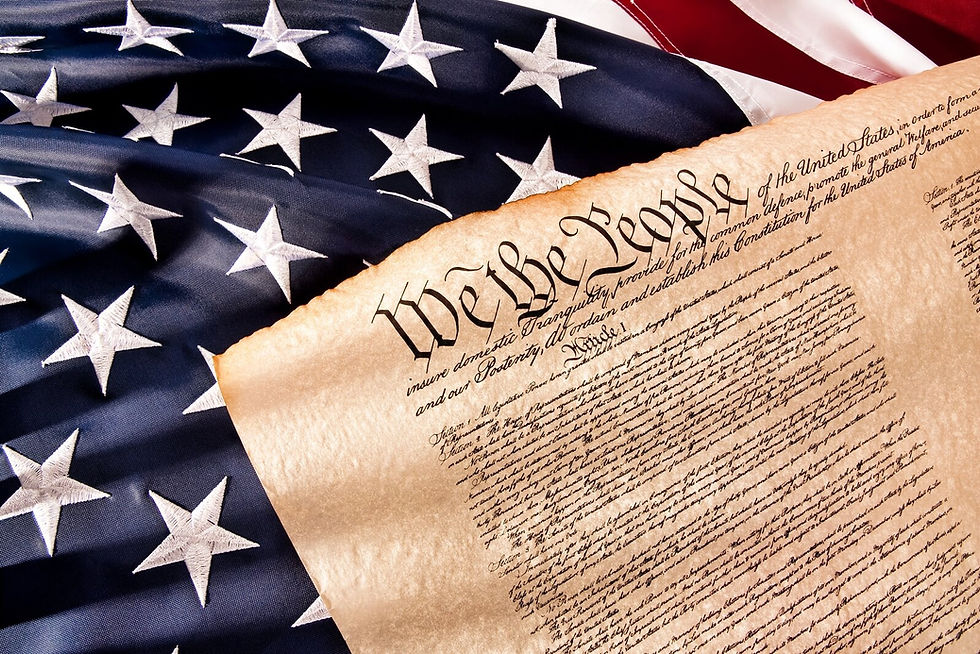The Anatomy of a Criminal Prosecution and Plea Bargaining
- Judge Travis Kitchens

- Oct 5, 2025
- 4 min read
Updated: Oct 9, 2025
The Genesis of a Criminal Prosecution
A human being commits a criminal offense. Law Enforcement responds to a complaint and conducts an investigation. Eventually, the case is referred to the District Attorney who assigns a Prosecutor.
The Indictment
In a felony case the pleading required to continue prosecution is called an "Indictment". A body of 12 citizens called a "Grand Jury" meets and considers the evidence presented by the District Attorney or Prosecutor. If 9 of the 12 grand jurors find that "probable cause" exists to warrant further prosecution, then the indictment is filed in the District Court. "Probable Cause" is a legal standard defined as a reasonable belief that a crime has been, is being, or is about to be committed. This belief must be based on specific facts and circumstances that would lead a reasonable person to believe that a crime has occurred or is imminent. Probable Cause is more than a mere suspicion but less than beyond a reasonable doubt, which is required for a conviction in court.
Proof Beyond a Reasonable Doubt
Section 2.01 of the Texas Penal Code provides "All persons are presumed to be innocent and no person may be convicted of an offense unless each element of the offense is proved beyond a reasonable doubt." The fact that a person has been arrested, confined, or indicted for, or otherwise charged with, the offense gives rise to no interference of guilt at trial.
The Elements of a Felony offense
The Texas Penal Code sets forth what actions constitutes a violation of law, by setting forth certain "elements" of the offense. Each element must be proved beyond a reasonable doubt.
The Duty of a Judge.
The primary duty of a Judge is to ensure that the State and the Defense obtain a fair and impartial trial. The trial Judge interprets and applies the law. This involves using Constitutional, Statutory and Case law to resolve disputes and ensure Justice. Trial Judges also manage the Court's docket, handle bail status, and conduct trials. They must maintain professional competence, be impartial and ensure that all proceedings are conducted with dignity and respect for all parties involved.
The Duty of State Prosecution
Article 2.01 of the Texas Code of Criminal Procedure states, in part: "It shall be the primary duty of all prosecuting attorneys, including any special prosecutors, not to convict, but to see that Justice is done. They shall not suppress facts or secret witnesses capable of establishing the innocence of the accused." The Prosecutor is responsible for collecting and organizing the evidence, and presenting the case to the Grand Jury. The Prosecutor is also required by law to make disclosure of the evidence and reports in the case to the defense Counsel.
The Duty of Defense Counsel
The Fifth Amendment of the United States Constitution and Article 1, Section 10, of the Texas Constitution guarantee the right of a citizen to be represented by Counsel in a criminal prosecution. The Criminal Defense lawyer is an advocate for the accused citizen scrutinizing the police conduct and evidence collection. The lawyer conducts investigations, questions witnesses, and examines evidence to develop a strong defense. The lawyer's duty is to identify any violations of the accused citizens rights, and to challenge the admissibility of evidence and to negotiate plea bargain deals to secure favorable outcomes for their clients. Overall, the criminal defense lawyers are essential in the Texas legal system, providing critical support to those facing criminal charges.
The Role of Plea Bargaining
Plea bargains are a cornerstone of the criminal justice process in Texas, as they are across the United States. In essence, a plea bargain is a negotiated agreement between the prosecutor and the defendant (often through their attorney) where the defendant agrees to plead guilty or no contest to a charge in exchange for concessions, such as reduced charges, a lighter sentence, or the dismissal of other counts. This mechanism allows cases to be resolved without proceeding to a full trial, which can be resource-intensive and time-consuming for all parties involved.
Trial Courts in Texas do not have enough Jury Trial weeks to try the hundreds of cases that get filed each year in the Courts. Normally, only the worst cases go to jury trial, but the prospect of a jury trial lead many accused citizens to enter into a plea bargain agreement with the Prosecution. When the Prosecution and the Defense Attorney have discharged their respective duties, they negotiate a resolution of the criminal charge to find a resolution short of a jury trial.
If the prosecutor and defense attorney presents an agreement to the Court, in most instances, the Court is going to accept the plea bargain terms. This is because the Court relies on the prosecutor and defense attorney to have conducted their respective investigations. In most cases, the Court is not aware of all the facts in a given case, save what the stipulation of evidence would be agreed upon by all Parties and filed as record admitting guilt or not contesting the evidence.
While plea bargains are efficient, their heavy reliance in Texas has drawn criticism, particularly regarding how prosecutors can misuse their authority. Prosecutors hold significant power in these negotiations, as they control charging decisions and can leverage that to extract pleas. This imbalance can lead to several disadvantages and ethical concerns.
In summary, while plea bargains are essential for managing Texas's criminal caseload, their misuse by prosecutors can undermine fairness, coerce vulnerable defendants, and skew justice toward efficiency rather than truth. Reforms, such as greater judicial oversight or limits on charge stacking, have been proposed to address these issues, but the system remains heavily reliant on these negotiations. Defendants facing charges should always consult experienced counsel to navigate these complexities.





Comments